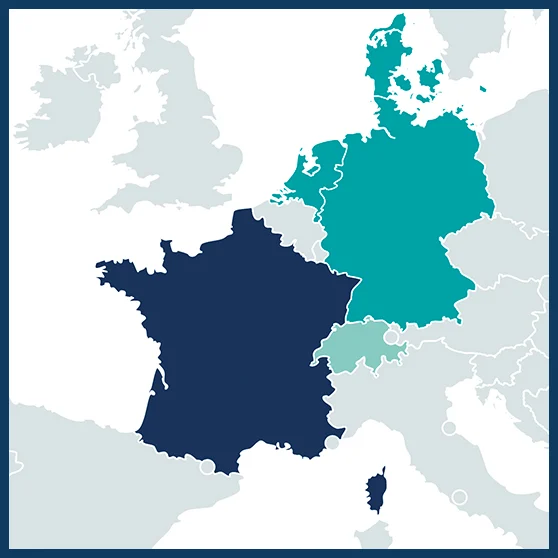01.01.2022 – 31.12.2024
€ 630,789
Jérémy PIFFADY
jeremy.piffady@inrae.fr
Coordinator: Functioning of hydrosystems (RiverLy), INRAE, Villeurbanne, France
Anthropized Continental Hydrosystems – Resources, Risks, Restoration (HYCAR), University of Paris-Saclay/ INRAE, Antony, France
Environmental Planning and Technology, University of Applied Sciences Trier, Birkenfeld, Germany
Aquatic ecology and water quality Management, Environmental Research, Wageningen University, Wageningen, Netherlands
Surface Waters, Swiss Federal Institute of Aquatic Sciences and Technology, Kastanienbaum, Switzerland

Many river restoration projects, recreating local hydromorphological structures and habitats, have been implemented worldwide aiming at improving the ecological status of rivers. However, ecological outcomes (e.g. improved community structure and functions, reinforcement of ecosystem processes) strongly depend on multiple drivers and processes at various spatial scales, submitted to multiple human stressors, also potentially affected by past conditions legacies. The landscape “context” is crucial in restoration planning but the quantitative effects of the various context variables in restoration practice, as well as the role of metacommunities, the scale issue and the role of legacy effects are still understudied and thus poorly considered. Furthermore, knowledge also lacks on societal needs and benefits from restoration, as most operations focus on the ecological quality criteria. The achievement of societal goals is rarely reviewed and factors of success are not yet systematically examined, although this is crucial for a complete and sustainable success of restoration project. In this context, COSAR is designed to identify the combined effects of context variables on both ecological and societal outcomes of river physical restoration projects, and which combinations favour synergies or antagonisms between both outcomes types.
COSAR aims to produce an operational framework to analyse outcomes of past restoration projects and to optimise the potential outcomes of future restoration projects in terms of both ecological and societal outcomes, by:
- defining and computing the relevant metrics to assess the ecological and the societal outcomes from restoration projects, and integrating these two sets of outcomes to assess their interrelationships at the catchment, sub-catchment and river reach scales;
- explaining how these sets of restoration outcomes are influenced by geographical, societal and environmental contexts, both considered in their spatial and temporal dimensions;
- co-constructing with a large set of stakeholder groups (national/regional/local environmental legislation and administrations responsible for restoration planning and funding; institutions responsible for implementation of restorations; consulting companies specialized in restoration; fishing, agricultural and tourism organisations; hydropower producers; environmental NGOs) an operational adapted and science-based integrative analysis framework to assess restoration outcomes;
- providing these stakeholders with clear guidelines about how to integrate these context-dependencies in their planning of future restoration projects, optimising the chances to achieve positive results and successful restoration projects.
COSAR will analyse complementary insights from taxonomic and functional dimensions of river communities for the ecological outcomes, and on-line societal feedbacks from social media and networks for the societal outcomes. To ensure the relevance of the restoration targets, context variables, and spatial scales considered in the analyses, COSAR includes a comprehensive process of stakeholder engagement. Six dedicated workshops will be held inviting all stakeholders’ groups to provide insights and feedbacks on the project design, analyses and product outreach. The stakeholders will also be involved in disseminating project results to their respective communities.
The COSAR project will produce an integrative analysis framework of restoration outcomes from both ecological and societal standing points to help stakeholders to design well-adapted restoration measures with respect to sites spatial and temporal context, and optimise future restoration planning. Along with the academic valorisation of the developed knowledge and methods, COSAR main operational outcomes will be summarised:
- A compendium of fact sheets, including sector specific perspectives, context influence summaries and case-studies reviews;
- An on-line application, allowing all interested stakeholders to easily test and use the model on their own sites.
These outcomes will be largely spread thanks to the important involvement of different stakeholders’ groups all along the project, the development of a project’s website and the use of institutional social networks.
The knowledge generated in COSAR will help all stakeholder groups involved to better accept and set up renaturation programs and individual projects in a targeted manner, assessing in early phase whether the achievement of specific ecological and societal goals is realistic in the respective environmental contexts, and thus help to optimise the restoration programs funding.
By providing its outputs for the next rounds of national/ regional restoration planning, COSAR will also help restoration programs to better promote aquatic and floodplain biodiversity, and the good ecological status requested by the EU Water Framework Directive; but by introducing societal outcomes of river restoration, COSAR will also promote public support of river restoration, which is crucial to bring all the European streams and rivers closer to a good ecological status.
COSAR will use existing monitoring data from 200 restoration projects. This dataset covers Germany (77 projects), Switzerland (15 projects), Netherlands (28 projects), France (28 projects), Finland (50 projects) and Liechtenstein (2 projects). The restoration projects represent a large diversity of river types, from small headwater streams to large rivers with a focus on medium rivers, and present different physical restoration plans and measures (length of river restored, type of physical intervention). Sampled taxa include fish and macroinvertebrates.
- Agence Nationale de la Recherche (ANR), France
- German Research Foundation (DFG), Germany
- Ministry of Agriculture, Nature and Food Quality (LNV), Netherlands